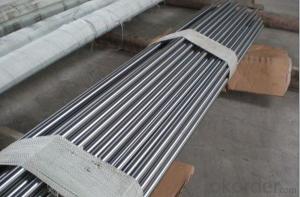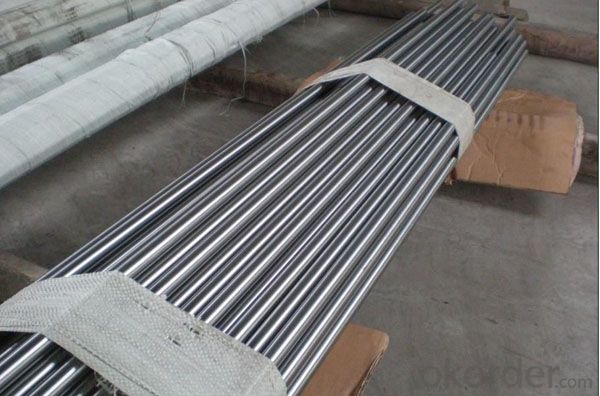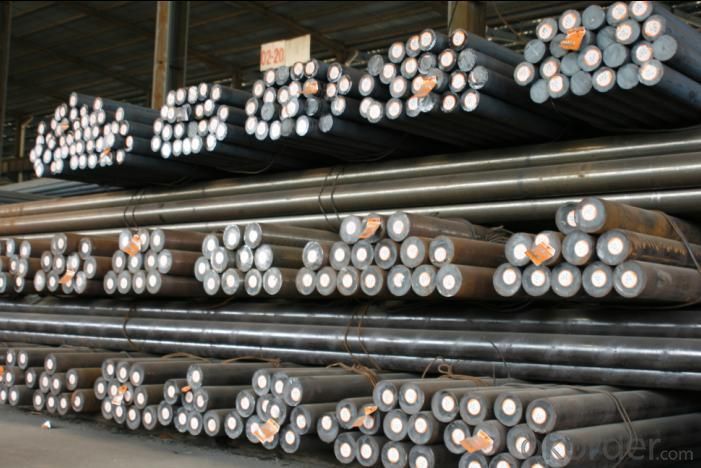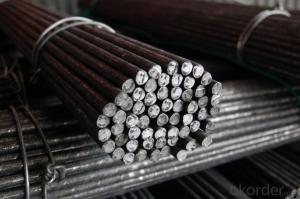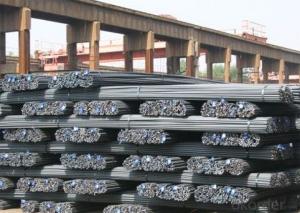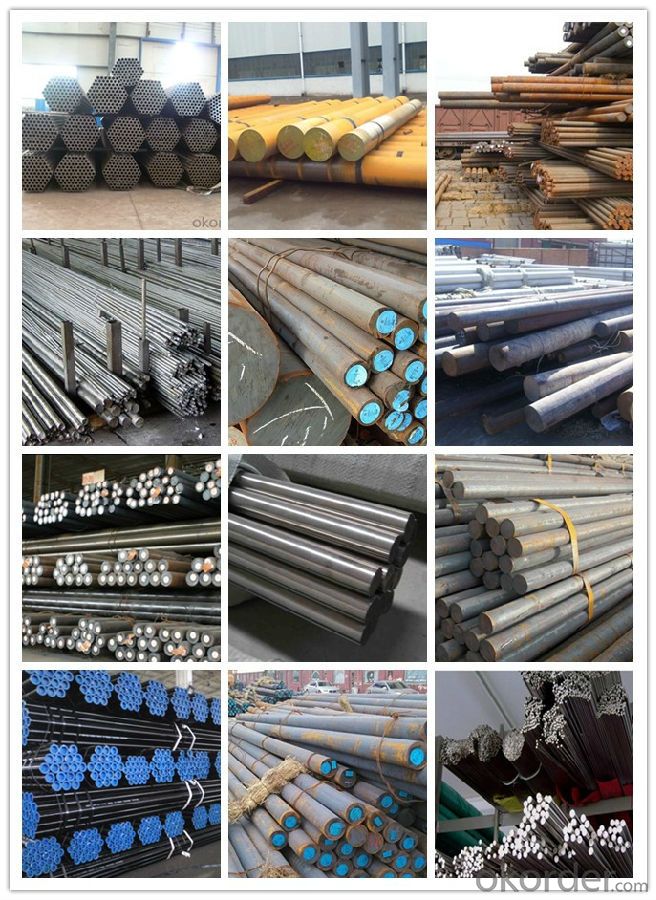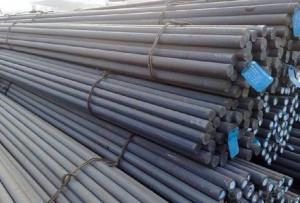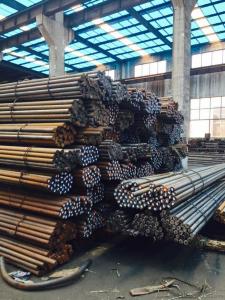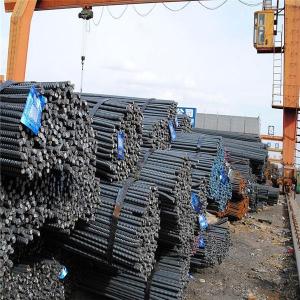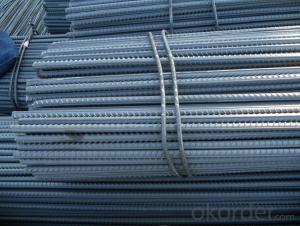Deformed Steel Bar HRB400 Construction Rebar
- Loading Port:
- China main port
- Payment Terms:
- TT OR LC
- Min Order Qty:
- 30 m.t.
- Supply Capability:
- 10000 m.t./month
OKorder Service Pledge
OKorder Financial Service
You Might Also Like
Specification
Product information:
| Commodity: | High quality hot rolled ribbed bar, Steel rebar, Deformed bars, Deform rebar |
| Standard & Grade: | GB1499-98 : HRB335,HRB400,HRB500 |
| BS4449-1997 : GR460B,GRB500B | |
| CAN/CSA-G30.18-M92 : 400W | |
| AS/NZS4671-2001 : GR300E, GR500E | |
| JIS G3112-2010 : SD345,SD390,SD490 | |
| ASTM A615 : Gr.40, Gr.60 | |
| DIN488-1984 : BST500 | |
| KS D 3504 : SD400 | |
| Diameter: | 6mm - 50mm |
| Length: | 6m,9m,12m |
| Packing: | Bundle packing |
| Origin: | China |
| Application: | Construction,Road,Machinery processing,Welding fields. |
| Delivery time: | 10-25 days |
| Shipment: | By bulk vessel or Container |
| Documents: | Mill Test Certificate,Commercial Invoice,Packing List,Certificate of Origin |
Product show
Workshop show
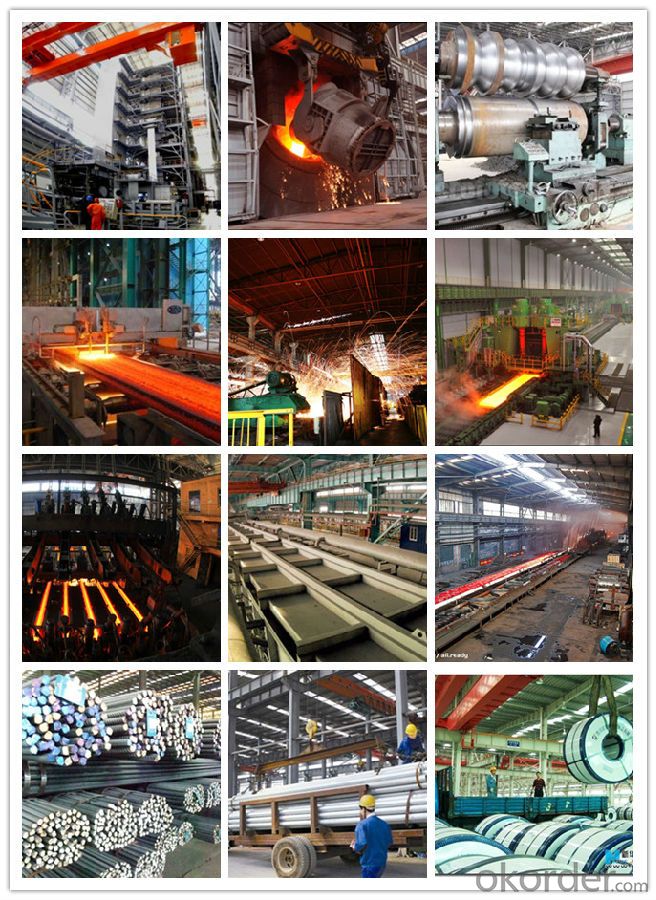
Shipping
1. FedEx/DHL/UPS/TNT for samples, Door-to-Door;
2. By Air or by Sea for batch goods, for FCL; Airport/ Port receiving;
3. Customers specifying freight forwarders or negotiable shipping methods!
Delivery Time: 3-7 days for samples; 5-25 days for batch goods.
Payment Terms
1.Payment: T/T, L/C, Western Union, MoneyGram,PayPal; 30% deposits; 70% balance before delivery.
2.MOQ: 1pcs
3.Warranty : 3 years
4.Package Informations: 1) EXPORT, In 20 feet (GW 25 ton) or 40 feet Container (GW 25 ton)
2)as customer's requirement
Why choose us?
(1) The leading exporter in China special steel industry.
(2) Large stocks for various sizes, fast delivery date.
(3) Good business relationship with China famous factories.
(4) More than 7 years steel exporting experience.
(5) Good after-sales service guarantee.
- Q: Can special steel be used in the medical device manufacturing industry?
- Yes, special steel can be used in the medical device manufacturing industry. Special steel alloys, such as stainless steel, are commonly used in the production of medical devices due to their excellent corrosion resistance, biocompatibility, and mechanical properties. These materials provide durability, sterilization compatibility, and are suitable for various medical applications, including implants, surgical instruments, and diagnostic equipment.
- Q: How does special steel perform in extreme cold temperatures?
- Special steel is specifically designed to perform well in extreme cold temperatures. It is made using alloys that have a low temperature ductility, meaning they can withstand and maintain their structural integrity even in extremely cold conditions. This type of steel is often used in applications such as Arctic exploration, oil and gas operations in cold environments, and in the aerospace industry. One of the key properties of special steel is its ability to resist brittleness at low temperatures. Unlike regular steel, which becomes brittle and prone to cracking in extreme cold, special steel retains its toughness, making it suitable for use in sub-zero conditions. This is achieved by carefully selecting and controlling the composition of the alloy, which allows for a better balance between strength and ductility. Furthermore, special steel has excellent corrosion resistance, which is particularly important in cold environments where exposure to snow, ice, and moisture is common. The alloying elements in special steel, such as chromium and nickel, form a protective oxide layer on the surface, preventing corrosion and maintaining the structural integrity of the steel. In addition, special steel also has good thermal conductivity, which means it can efficiently transfer heat even in extreme cold temperatures. This property is crucial in applications where heat management is essential, such as in the aerospace industry or in equipment operating in cold climates. Overall, special steel is specifically engineered to perform exceptionally well in extreme cold temperatures. Its low temperature ductility, resistance to brittleness, corrosion resistance, and thermal conductivity make it a reliable and durable material for various applications in cold environments.
- Q: What are the properties of wear-resistant tool steel?
- Wear-resistant tool steel is characterized by its high hardness, strength, and resistance to abrasion and wear. It has a high carbon content, typically ranging from 0.7% to 1.5%, which contributes to its hardness and wear resistance. This type of steel is also known for its ability to retain its hardness even at high temperatures, making it suitable for applications that involve friction and heat. Additionally, wear-resistant tool steel usually exhibits good toughness and machinability, allowing it to withstand heavy usage and be easily shaped into various tool forms.
- Q: What is the role of heat treatment in special steel?
- The role of heat treatment in special steel is to enhance its mechanical properties and improve its performance by altering its microstructure through controlled heating and cooling processes. This helps to achieve desired properties such as increased hardness, strength, toughness, and ductility, as well as improved wear resistance and corrosion resistance. Heat treatment also allows for the refinement of grain structure, elimination of internal stresses, and modification of the steel's crystalline structure, which ultimately improves the overall quality and usability of special steel in various applications.
- Q: What are the different coating options available for special steel?
- Some of the different coating options available for special steel include galvanizing, powder coating, electroplating, and organic coatings such as epoxy or polyurethane. These coatings provide protection against corrosion, enhance durability, and improve the aesthetics of the steel.
- Q: How does special steel contribute to improving product safety?
- Special steel contributes to improving product safety in several ways. Firstly, special steel is known for its exceptional strength and durability, which enhances the structural integrity of various products. This ensures that they can withstand heavy loads, extreme temperatures, and other challenging conditions without compromising safety. Secondly, special steel often possesses excellent corrosion resistance, reducing the risk of product failure due to rust or degradation over time. Additionally, certain types of special steel offer high impact resistance and resistance to wear and tear, making products more resistant to damage and increasing their lifespan. Ultimately, by incorporating special steel into the manufacturing process, products can be made safer, more reliable, and longer-lasting for the benefit of consumers.
- Q: How is special steel used in the medical manufacturing process?
- Special steel is used in the medical manufacturing process for various applications such as surgical instruments, implants, and medical devices. Its unique properties, including corrosion resistance, strength, and biocompatibility, make it ideal for ensuring the quality, durability, and safety of medical equipment.
- Q: What are the challenges in surface treating special steel?
- When it comes to surface treating special steel, a range of challenges can arise due to the unique properties and composition of the material. Some of the main challenges that need to be addressed are as follows: 1. Hardness: Special steels often possess a high level of hardness, which poses difficulties in achieving effective surface treatment. Traditional methods like heat treatment or chemical processes may not be sufficient to modify the surface properties without impacting the core strength. 2. Surface contamination: During the surface treatment process, special steels are vulnerable to contamination. Even the smallest traces of impurities or foreign materials can compromise the integrity of the treated surface. It is crucial to maintain a controlled environment and utilize clean equipment to minimize the risks of contamination. 3. Complex alloy composition: Special steels are typically alloyed with various elements to enhance specific characteristics, such as corrosion resistance or high temperature stability. This complex composition can make it challenging to find suitable surface treatment techniques that can effectively modify the surface properties without negatively affecting the overall performance of the alloy. 4. Adhesion and coating uniformity: Ensuring good adhesion and coating uniformity on special steel surfaces can be problematic. The surface characteristics and microstructure of special steels can make it challenging for coatings or treatments to properly and evenly adhere. Special attention must be paid to surface preparation and the selection of appropriate primers or coatings to ensure optimal adhesion and uniformity. 5. Heat sensitivity: Some special steels may be sensitive to heat during surface treatment processes. Excessive heat exposure can lead to changes in the material's properties, including structural alterations or deformation. It is essential to carefully control temperatures and employ suitable cooling methods to prevent any undesirable effects on the steel during the surface treatment process. 6. Cost: The process of surface treating special steel can be costly due to the specialized equipment, materials, and expertise required. Additionally, the challenges mentioned above can increase the complexity and time needed for surface treatment, resulting in higher costs. It is crucial to take these factors into consideration when planning and budgeting for surface treatment on special steel components.
- Q: What are the different methods for tempering special steel?
- There are several methods for tempering special steel, each with its own advantages and considerations. Some of the common methods used for tempering special steel include: 1. Air Tempering: This method involves heating the steel to a specific temperature and then allowing it to cool in still air. Air tempering is often used for low alloy steels and results in a uniform hardness throughout the steel. 2. Oil Tempering: In this method, the steel is heated to a specific temperature and then quenched in oil to cool it rapidly. Oil tempering is commonly used for tool steels as it provides a good balance between hardness and toughness. 3. Water Tempering: Similar to oil tempering, water tempering involves quenching the steel in water after heating it to a specific temperature. This method provides a higher rate of cooling and results in a harder steel, but it may also lead to increased brittleness. 4. Salt Bath Tempering: In this method, the steel is immersed in a molten salt bath at a specific temperature. The salt bath provides a more controlled and uniform heat transfer, resulting in a consistent hardness throughout the steel. 5. Cryogenic Tempering: Cryogenic tempering involves cooling the steel to extremely low temperatures, often below -100°C (-148°F), using liquid nitrogen or helium. This method helps to further reduce residual stresses and increase the wear resistance of the steel. It is important to note that the specific method chosen for tempering special steel depends on various factors, including the type of steel, desired hardness, intended application, and the desired balance between hardness and toughness. It is crucial to follow proper heat treatment guidelines and consult with experts to ensure the best results for a specific steel alloy.
- Q: What are the requirements for special steel used in chemical processing?
- The requirements for special steel used in chemical processing are generally more stringent compared to regular steel due to the harsh and corrosive nature of the chemicals involved. Some of the key requirements for special steel in chemical processing include: 1. Corrosion resistance: Special steel used in chemical processing must exhibit high resistance to corrosion from acids, alkalis, and other corrosive chemicals. This is achieved by adding alloying elements such as chromium, nickel, and molybdenum, which form a protective oxide layer on the surface of the steel, preventing it from reacting with the chemicals. 2. High temperature resistance: Chemical processing often involves high-temperature reactions. Therefore, special steel used in this industry must have excellent heat resistance to maintain its strength and structural integrity at elevated temperatures. This is achieved by adding elements like chromium, nickel, and tungsten, which help in maintaining the stability of the steel at high temperatures. 3. Mechanical strength: Special steel used in chemical processing should possess sufficient mechanical strength to withstand the pressures and loads encountered in the process equipment. This requirement is met by adding alloying elements such as manganese, silicon, and carbon, which enhance the steel's strength and toughness. 4. Weldability: Weldability is a crucial requirement for special steel used in chemical processing as it allows for easy fabrication and installation of process equipment. Special steel with good weldability ensures strong and reliable joints, which are essential for the safe and efficient operation of chemical plants. 5. Resistance to stress corrosion cracking: Stress corrosion cracking is a significant concern in chemical processing environments. Therefore, special steel used in this industry should have good resistance to stress corrosion cracking, which is achieved by carefully selecting the alloying elements and controlling the material's microstructure. 6. Cleanliness: Special steel used in chemical processing should be free from impurities and have a low content of harmful elements that could contaminate the process or react with the chemicals. This necessitates strict quality control measures during steel production to ensure the desired cleanliness and purity. Meeting these requirements ensures that special steel used in chemical processing can withstand the aggressive chemical environment, high temperatures, and mechanical stresses encountered in the industry, leading to safe and reliable operation of the process equipment.
Send your message to us
Deformed Steel Bar HRB400 Construction Rebar
- Loading Port:
- China main port
- Payment Terms:
- TT OR LC
- Min Order Qty:
- 30 m.t.
- Supply Capability:
- 10000 m.t./month
OKorder Service Pledge
OKorder Financial Service
Similar products
Hot products
Hot Searches
Related keywords
